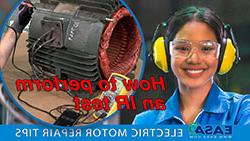Pump Curves/Applications: Installation & Troubleshooting
Course length: One day
Available as a condensed course: No
Maximum number of students: N/A
Instructor: Gene Vogel, EASA Pump & Vibration Specialist
The most common machine to be driven by an electric motor is a pump. Centrifugal pumps are by far the most common devices for moving industrial liquids of all types. A thorough understanding of the design, implementation and maintenance of centrifugal pumps is essential for those working in the electric motor repair industry. This one-day seminar provides the practical knowledge service center personnel need to address customers’ pump-related motor issues, and the broader opportunities for pump maintenance, system optimization and energy savings.
Partial List Of Topics
- Using pump curves to evaluate pump applications
- What is a centrifugal pump?
- Centrifugal vs. PD pumps
- Centrifugal impeller design
- Pump parameters
- Flow
- Press & head
- Pressure & head
- Efficiency/power relationship
- Head/flow curves
- Multi-trim curves
- Efficiency curve
- Power curve
- Cavitation
- Causes of cavitation
- Affects of cavitation
- NPSHA & NPSHR
- Controlling pumps with variable speed
- Matching pump performance to applications
- Series and parallel pumps
- Positive displacement pump relationships
- Pump installations
- Piping concerns
- Foundations and bases
- Shaft alignment
- Startup precautions
- Troubleshooting
- Measuring pump performance
- Isolating pump, system and fluid problems
- A simple troubleshooting flowchart
Cost
- Chapter/Region fee (+expenses): $2300 + $45/student
- Member company fee (+expenses): $3700 + $60/student
- Nonmember fee (+expenses): $5400 + $65/student
- (Additional fees may apply if travel time exceeds 5 hours. Contact EASA for details.)
Schedule a private seminar
To schedule a private seminar for your group, contact:
Dale Shuter, CMP
Meetings & Expositions Manager
+1 314 993 2220, Ext. 3335
dshuter@mblayst.com
Hosting requirements
In addition to the seminar fees, the seminar sponsor will be responsible for:
- All seminar promotion involved
- Breaks (if provided)
- Meeting room (approx. 1,000 square feet)
- Instructor's travel and living expenses
- Audio/visual equipment
- Shipping costs of materials
- Meals (if provided)

 Having trouble finding time for training? Check out the how-to videos in EASA’s new series Electric Motor Repair Tips.
Having trouble finding time for training? Check out the how-to videos in EASA’s new series Electric Motor Repair Tips.


